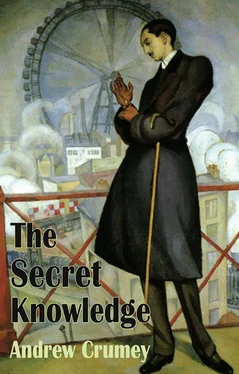“I wish your wife good health, sir.”
“We pray for her.”
Jessie crosses herself; no one else cares to repeat the gesture. Pierre is invited to serve himself the stew steaming in a casserole whose size emphasises the frugality of the contents. He takes a spoonful.
“Go on, lad,” the doctor urges. Slices of buttered bread lie on a plate beside a pot of tea. John Quinn looks at his sister and sees how she stares at the stranger, as much in awe as John himself. Taking a piece of bread, Pierre appears perfectly at ease.
“Are you Parisian?” Jessie asks.
“I was.”
“It must be so beautiful. Will you go back?”
“I think not.”
She, too, catches the seductive aroma of secrecy. Surely a woman, she guesses. “Do you like Scotland?”
“Certainly.”
“What in particular?”
Pierre smiles. “Not the weather, of course. But the landscape, the colours.”
“The people?”
“Yes, very friendly and welcoming. And the history.”
“I love history,” she says quickly. “When I was at school it was always my favourite subject.”
“But we learned so little of it,” John interrupts. “Real history, I mean. It was only kings and queens and battles and treaties.”
His sister’s mystified. “What else could it have been?”
“The lives of ordinary working folk.”
She laughs. “We know enough about that already.”
“I don’t know that you do.”
Dr Quinn intervenes. “Stop bickering, you two.”
“It’s just a discussion,” John says. “Pierre, you agree with me, don’t you? The history books are written by the ruling class and only tell their side of the story.”
All look to Pierre for an answer. He pouts thoughtfully as he considers the question. “There is always another side to everything.”
“Exactly!” says John.
“Even in the stories of the ruling class there may be something worth hearing.” He looks at Jessie while he speaks, and John begins to wonder if his new friend is really a socialist after all.
There is a loud knock at the front door; Jessie goes to answer.
“History is a science,” John says in a low voice that is almost belligerent. “They don’t teach the laws of history at school…”
But before he can elaborate further, Jessie comes back. “Father, there’s been an accident at the foundry.”
Dr Quinn shoots to his feet with sudden youthfulness. “Well then, I’d better see what some poor fool’s gone and done to himself.”
He goes to the hallway followed by his daughter, leaving John to pick up a theme he is unable to relinquish. “You agree, I suppose?”
“About the laws of history?”
“Otherwise I can’t understand why you might want to help with Advance . Why you stopped at the gate to talk to me, why you came here.”
Pierre considers the matter and in the gaslight looks almost beautiful. “Why?” he says. “Because history demands it. Yes, there are laws, John, as powerful as gravity, but they’re not for everyone to learn.”
“You don’t believe in educating the proletariat?”
“I’m not a Marxist.”
“Then what the devil are you? How can I know you’re not some management spy?”
“I suppose you can’t. I should leave.”
“No. But I don’t know if I should trust you.”
“You don’t have to. I wish to help, that’s all. Give me some of your newspapers and I’ll sell them at the works.”
“You could be sacked.”
“I’m not afraid. I’ll write for you, speak at your meetings, whatever you require. And if you like, you can always assume that I’m a spy. That way you’ll never tell me anything you wouldn’t want the enemy to hear.”
Jessie is closing the front door on her father, soon to come back. “I can’t work you out at all,” John says to Pierre.
“Then don’t try. Let’s simply be friends.”
As Jessie enters she sees their handshake, feels the eerie solemnity of the alliance. That night, writing to her ailing mother, she makes no mention of it.
The newspaper is produced at Maclean’s printing works, whose usual output is headed stationery or calling cards for inhabitants of the town able to afford such tokens of prestige, though lately it has been matter of another kind that has rolled from the presses, the printing shop serving as editorial office for as long as the Advance committee can keep up regular payments and avoid prosecution. Ten days after first meeting Pierre, John Quinn is there amid the rhythmic clatter of the machinery, looking at the freshly produced sheet being held up for his perusal.
“You’ve misspelled committee.”
“Eh?” Angus Blackhorn, sleeves rolled dirtily up his ink-blackened arms, peers where Quinn indicates, and discovers the misprint. “Damnation!”
“We can’t let it go like that.”
“What, re-do the whole bloody run?”
“Or correct them by hand.”
“Stay all night, then,” Blackhorn bawls irritatedly above the mechanical din. “You and that damn idiot Harry Orr.”
“We have to do something about it.”
“Smash his bloody teeth’s what I’ll do when he gets here. Calls himself a proof reader and can’t spell committee.”
At the far end of the room, typesetter Malcolm Baine is going about his work, glad to be beyond range of Blackhorn’s verbal shrapnel, though not for long.
“Aye, you as well, Baine, at least Orr’s got a bloody mouth. How did you not see it? 24-point headline!”
Quinn attempts diplomacy. “It’s nobody’s fault, Angus.” This only lights another fuse.
“It’s everybody’s fucking fault! Orr and Baine and you too. All the decent men got blown to buggery, that’s the problem.”
Quinn’s ears are hurting, he carries the still-wet sheet to the adjoining room where Joe Baxter, sitting peacefully and caressing warm tea in a tin mug, looks up and asks, “What’s the matter with you, then?” When Quinn shuts the door on the noise and tells him, he laughs. “Committee? You reckon there’s five people in Kenzie know how to ruddy spell?”
Quinn pulls a chair beside the old man, spreads the sheet on the table and reads the rest of it, fearing further errors. But the date and venue of the public meeting are correctly given, the arguments in favour of a forty-hour working week appear in order. From the page, words come forward for inspection: industry, grievance, solidarity, participate; stepping out of context of neatly printed lines and standing to attention looking proud, obedient, doomed.
“Discovered any more?” Joe Baxter asks after a while.
“Not yet.”
“When you’ve been in the trade as long as me you know how little it matters to anyone else, it’s only ourselves who notice.” Quinn keeps reading but Baxter, on his break, is in conversational mood. “We like to do a perfect job, that’s natural. Nothing worse than slack work, makes me irate when I see a badly set line in a newspaper, even books these days are in a poor state and not only because of the war. Young ones now have no self respect, not like when I started. Do your shift and draw your wage, that’s their way, and never mind the task in hand. It’s a sad business. I wouldn’t want to be your age now, John, not with the way the world’s going. Soon you’ll all be pushing buttons ten hours a day.”
Quinn looks up. “Not on basic pay though.”
Baxter laughs and raises his mug. “A toast to the revolution and home rule.”
The door opens before they can discuss it further and Pierre Klauer briskly enters, cheerfully depositing his canvas bag on the table. Quinn moves his page clear of the intrusion.
“I sold nearly all of mine today,” Pierre announces, opening the bag to show how few copies of Advance lie bent beside a bundle of greasy brown paper containing the remains of his dinner.
Читать дальше











